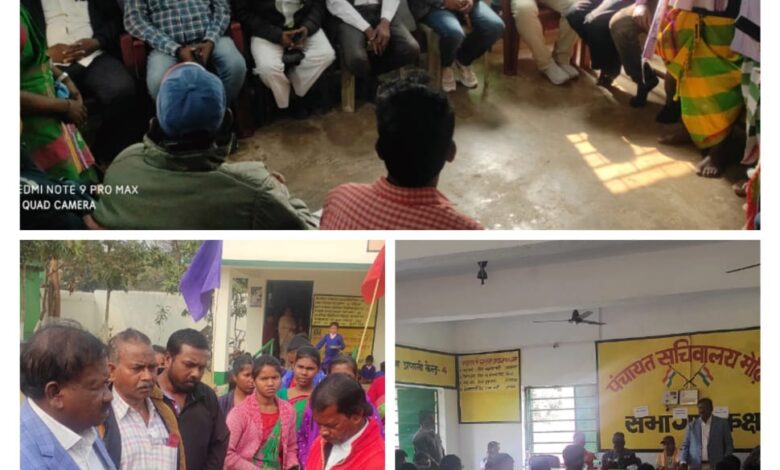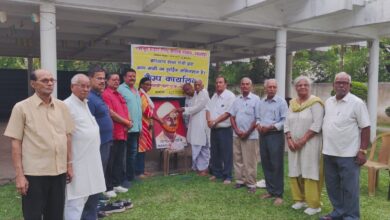विधायक रामदास सोरेन जी मेड़िया स्थित विदु चांदन पुस्तकालय में आयोजित समारोह में हुए शामिल

मुसाबनी । विदु चांदन पुस्तकालय मेढिया द्वारा अयोजित प से विदु चांदन पुस्तकालय अपने 8 वर्षीय कार्य प्रणाली को लोकप्रिय विधायक रामदास सोरेन जी के उपस्थिति में अपने कार्य को पुस्तकालय परिवार संस्थापक सदस्य एवं लिदरशिप टीम के द्वारा विदु चांदन पुस्तकालय के उद्देश्य लक्ष्य का बखान विधायक जी के सामने रखा, 8साल के कार्य काल में शिक्षा के छेत्र में पुस्तकालय ने उच्च शिक्षा पढ़ने में बच्चों को प्रवेश कराया गया, गांव के समाजिक कार्य में भी भागीदारी निभाई गई है, स्वस्थ के क्षेत्र में भी काफ़ी अहम भूमिका पुस्तकालय ने बीमार माझी बाबा दिवंगत बिक्रम हांसदा के इलाज में काफी सहयोग किया गया, पुस्तकालय परिवार ने विधायक जी एवं ग्राम प्रधान के संयुक्त हस्ताक्षर से लड़के लड़कियों को Certificat of Apreciation दिया गया, जो निम्न है कुमारी बाहा हांसदा, श्री आकाश मुर्मु, श्री प्रकाश मुर्मु, श्री मनीष सोरेन, श्री राज मार्डी , श्री गणेश मुर्मु, श्री दासमत हांसदा, श्री मनमोहन किस्कू, श्री रघु नाथ किस्कू, श्री विकाश हंसदा , कुमारी दुलारी हंसदा, श्री दासमत हांसदा (रोहन), कुमारी तुलसी हांसदा, कुमारी प्रियंका हंसदा, कुमारी प्रियंका हंसदा , श्री मिर्जा हंसदा, श्री शिवा किस्कू, श्री शंकर किस्कू, श्री मिलन किस्कू आदि बच्चो को प्रमाणपत्र विधायक जी के हाथों से वितरण किया गया, विधायक जी ने अपने संबोधन में कहा कि उपस्थित बच्चो को आज जो प्रमाण पत्र जारी किया गया, अगली बार मैं आपको अपके सेवा कार्य को मैं सरकारी स्तर से प्रमाण पत्र दिलाऊंगा , आज मैं आपको वचन देता हूं की अगले विधान सभा शत्र में मेड़िया ग्राम को आदर्श ग्राम बनवाने के लिए जोरदार तरीके से उठाऊंगा, विधायक जी ने बिदु चांदन पुस्तकालय के संस्थापक श्री दुखी राम हेंब्रम जी से कहा कि पुस्तकालय विकाश के लिए 2लाख रूपया अपने फंड से दूंगा आप बजट बनाई।
इस मौके पर पंचायत के मुखिया महोदया सुश्री बाशो हंसदा, पसस प्रति निधि रमेश सोरेन, मेडिया माझी बाबा पारसेन हांसदा, नायके बाबा सुभाष हंसदा, झामुमो प्रखंड अध्यक्ष प्रधान सोरेन, सचिव सोमाय सोरेन, लाओकेसरा माझी बाबा मातु मार्डी , वरिष्ठ नेता जगदीश बास्के, गुड़ाबंदा प्रखण्ड अध्यक्ष सुराई टुडू, आयोजक में दुखी राम हेंब्रम, दसमत हांसदा, कादे टुडू, मोहन चंद्र मुर्मू आदि मौजूद रहे हैं।


